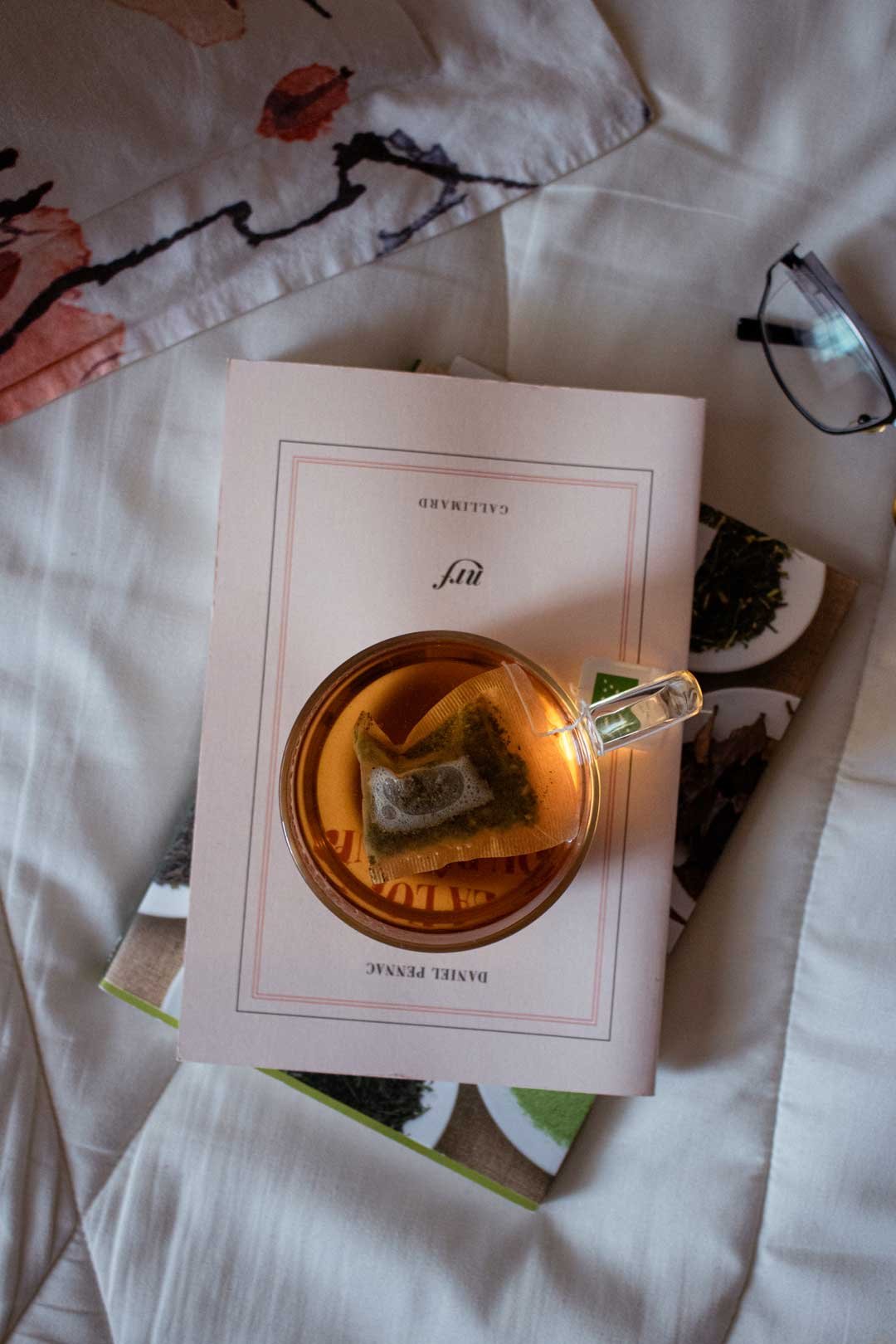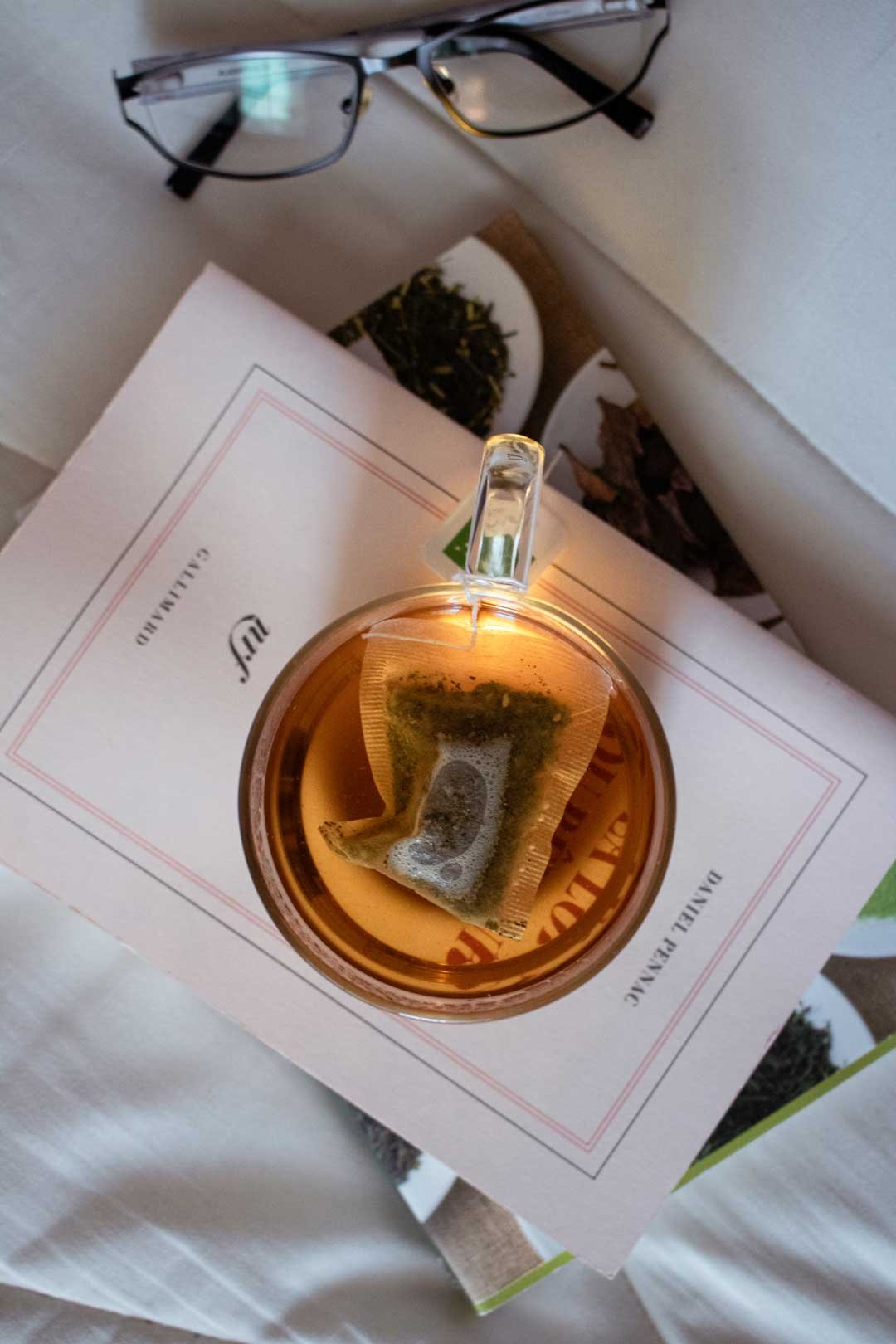5 Teas That Help You Sleep Better
Do you have problems sleeping?
You are not alone.
More than 1 out of 5 Americans suffer from sleep issues.
Drinking the right bedtime tea is an easy way to improve your sleep.
And because feeling tired all day sucks, I compiled for you a list of 5 teas that help you sleep.
Let’s dig into the subject.
Should You Drink Tea Before Bed?
You might have some reservations about drinking tea before bed.
After all, tea is associated with caffeine, just like coffee.
But there are indeed teas that help you sleep better.
It’s just that not all ¨teas¨ are real teas.
To clear up misconceptions, let’s try to distinguish them.
What’s the Difference Between Tea and Herbal Tea
Tea is a beverage with a long history.
It is made from leaves of the Camellia Sinensis plant which are brewed in hot water.
Herbal tea (aka tisane) is also an infusion.
But it doesn’t contain any tea leaves.
It is made from leaves, flowers, fruits, barks, and roots from various plants such as:
Mint
Hibiscus
Lemon
Verbena, and many others.
So while tea has caffeine, most herbal teas don’t.
Caffeine in Tea
Caffeine is a stimulant many people rely on to fully wake up in the morning (aka morning coffee or tea).
It’s interesting to know that:
A cup of coffee contains more caffeine than a cup of tea (approximately 4 times more than black tea and 6 times more than green tea)
Caffeine in coffee affects you differently than it does in tea.
Coffee will give you a quick boost of energy followed by a caffeine crash.
In comparison, tea will also give you energy but in a stable, calming way.
This is because tea contains a compound called L-Theanine.
L-Theanine interacts with caffeine and makes it less potent.
But if what you need is sleep, caffeine should be avoided.
In fact, the intake of caffeine up to 6 hours before bedtime can disrupt your sleep.
So generally speaking, it‘s best to drink caffeine-free teas in the evening.
Pro-tip: For a low caffeine tea, pre-steep your tea for 30 seconds in hot water and discard this first brew. It will reduce the caffeine in your cup by 50 to 70%.
5 Teas That Help You Sleep
Herbal teas are generally safe.
That said; you might want to consume them in moderation in special circumstances such as pregnancy.
Now, let’s see exactly what teas can help you get a good night of sleep.
1. Chamomile Tea
The dried flowers of chamomile have been traditionally used in many forms (tea, oil for aromatherapy) to treat insomnia, anxiety, and even hysteria.
Its sedative effects might come from a flavonoid called apigenin.
Apigenin is said to induce muscle relaxation.
So people drink chamomile tea as a natural sleep aid.
2. Lemon Balm Tea
Lemon balm tea is made from the leaves of the Melissa Officinalis plant.
It has been used for centuries as a natural remedy for various health problems such as:
Sleep disorder
Anxiety
Digestive conditions
Studies suggest lemon balm has a soothing effect that relieves stress and helps you sleep better.
3. Passionflower Tea
This tea is made from the dried flowers of the Passiflora Incarnata plant.
Much like chamomile tea, passionflower tea has a long history of use for insomnia.
It is widely used to make sedatives in combination with other herbs.
Studies also show that passionflower helps reduce physical and psychological stress.
4. Magnolia Bark Tea
Magnolia is used as an herbal supplement in Chinese medicine.
It is thought to reduce anxiety and enhance mood.
The bark of the magnolia tree contains a compound called honokiol.
Honokiol, by binding to GABA receptors in the brain, helps you fall asleep faster.
5. Valerian Tea
Made from the dried roots of the valerian plant, valerian tea has a calming effect on the body.
Valerian roots contain valepotriates and sesquiterpenes.
Those compounds are known for their natural sedative properties.
Also, one study reported long-term use of valerian preparations:
Improve the ill-effect of stress
FAQ
How Long Before Bed Should You Drink Tea?
As a general rule, it is best to have your last cup about 2 to 3 hours before bed.
Sleeping right after drinking tea will likely lead you to use the bathroom during the night.
It is also recommended to use the bathroom directly before sleeping to avoid any unwelcome wake-up call.
What Teas Should You Not Drink Before Sleeping?
All teas made from leaves of the Camellia Sinensis contain some caffeine and might prevent you from falling asleep if consumed 3 to 6 hours before bedtime.
Other beverages to avoid include:
Coffee
Cocoa
Caffeinated sodas
Alcohol
It‘s Worth Steeping Before Sleeping
Insomnia is a real problem that can seriously impact your health and social life.
Drinking one of the herbal teas I mentioned regularly enables you to:
Improve the quality of your sleep
Relax with a soothing cup of tea after a long day
Create a great sleep routine that prepares your mind and body for sleep
And if you want to know in detail what tea contains more or less caffeine; I encourage you to read our dedicated article Caffeine in Tea.





